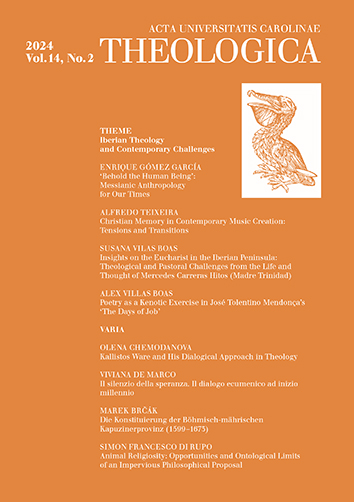AUC Theologica je recenzovaný odborný teologický časopis, který vychází dvakrát ročně. S výjimkou slavistických témat, recenzí a zpráv zveřejňuje příspěvky pouze ve světových jazycích – v angličtině, němčině, francouzštině a italštině.
Časopis se zaměřuje na širokou škálu teologických disciplín, jako je například systematická teologie, biblistika, patristika, pastorální a spirituální teologie, katechetika nebo církevní historie. V rámci nich se snaží reflektovat současná témata, která často vyžadují interdisciplinární přístup. Vítáme také teologické články, které se dotýkají jiných akademických oborů, jako je například filosofie, sociologie, literární věda či vědy přírodní.
Každé číslo se skládá ze dvou sekcí. Tematická sekce obsahuje články s jednotným zaměřením. V sekci s názvem „Varia“ publikujeme původní studie na různá aktuální teologická témata. Všechna čísla časopisu jsou dostupná v režimu Open Access.
AUC THEOLOGICA, Vol 2 No 1 (2012), 63–86
Muž jako hlava rodiny. Biblicko-teologická studie k Ef 5,21–6,9; Kol 3,18–4,1
[Man as the head of a household. Exegesis of Ephesians 5:21–6:9 and Colossians 3:18–4:1]
Mirej Ryšková
DOI: https://doi.org/10.14712/23363398.2015.48
zveřejněno: 26. 06. 2020
Abstract
The text is dealing with the so called household (status) codes (Haustafeln) especially in the Letters to Colossians and Ephesians. Both texts, parts of a more voluminous parenesis for the community of the church, are based on a scheme typical for that period of relations between man and woman, parents and children, and lords and slaves in a household. The Christian interpretation of that scheme in the Letters to Colossians and Ephesians brings a significant innovation, because it is based on a new understanding of man as renovated in Christ. Although the patriarchal order is maintained, still these relations are seen in a new way in which the decisive role is played by pointing to Jesus Christ and his relation to the church. In the Letter to Ephesians first of all the relation between man and women is elaborated and their unity is stressed. The example and at the same time the place of realisation of their relation is the relation between Christ and the church. This relation full of love, obedience and selfsacrifice from both sides ought to fill and represent the Christian marriage. The Letter to Colossians deals with the relation between the lords and the slaves. This relation is again made relative by pointing to Christ. A.significant moment is stressing the dignity of human work, because it is – irrespective of human evaluation – service to Christ himself. Also the relation between parents and children is seen as a partnership with duties from both sides. Beyond that, the letter to Ephesians stresses the duty of parents to educate in faith, to pass the values of life. These texts, though they are often understood as sanctification of patriarchal structures, in reality want to lead to responsible and effective family life in which everyone has his or her role and responsibility. This is the lasting message of these texts irrespective of the momentary social structures which are passing.
klíčová slova: Letter to Colossians; Letter to Ephesians; exegesis; household codes; biblical ethics

Muž jako hlava rodiny. Biblicko-teologická studie k Ef 5,21–6,9; Kol 3,18–4,1 is licensed under a Creative Commons Attribution 4.0 International License.
148 x 210 mm
vychází: 2 x ročně
cena tištěného čísla: 100 Kč
ISSN: 1804-5588
E-ISSN: 2336-3398
